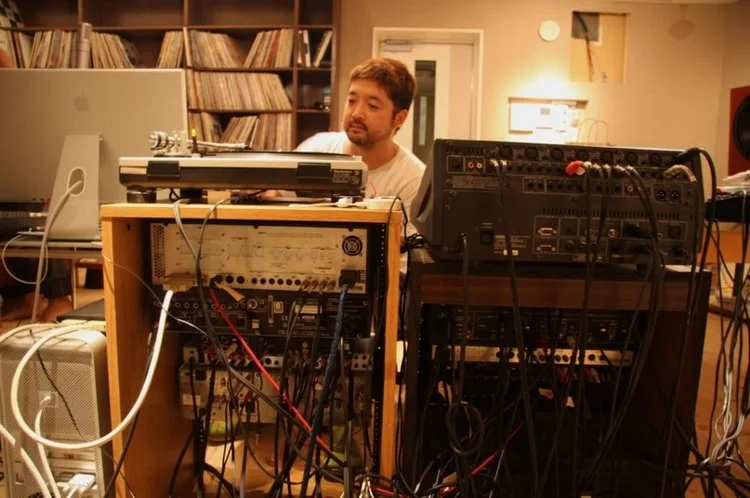On November 11, 2005, Hydeout Productions released Modal Soul, the second LP from the revered Japanese producer and instrumentalist Nujabes. Since its release Modal Soul has been enshrined in the canon of classic hip-hop, cherished by a dedicated following that is modest in number but unparalleled in passion. Nujabes is usually referenced as a hip-hop producer, but Modal Soul blends such disparate influences as to become a new, one-of-a-kind world music transcending all musical, physical or temporal boundaries. While each Nujabes project is a masterpiece in itself, Modal Soul is undoubtedly the producer's most dynamic and most popular effort.
It’s not uplifting lyrical content or the producer’s technical virtuosity that distinguishes Modal Soul, though the album has both in spades. What distinguishes Modal Soul is its mood, its essence. Splicing together a beat and a piano sample is no longer revolutionary, though Nujabes, real name Seba Jun (February 7, 1974 – February 26, 2010), does so with a master’s grace. Flipping the samples and aligning the sound to make the listener feel with such great depth – that is the revelation of Modal Soul. If you don’t feel the music, that’s okay. But for those who do, it is healing sound. It is fuel for imagination, a foundation for dreams, no less important than any music ever made.
Modal Soul can be seen as a quintessential product of the 21st century. Follow me. Access to music has never been as horizontal as it is in the new millennium. In the past, musicians were limited by time and space to those resources at their direct disposal. For example, French pianist Claude DeBussy sparked a compositional revolution by experimenting with a semi-tone scale at the turn of the 19th century. DeBussy would have never used this Eastern scale - opposed to the whole-tone scale and foreign to all Western conception of what music should be - had he not heard a gamelan orchestra from the island nation of Java perform at the 1889 Paris Universal Exposition.
These geographic and temporal boundaries no longer exist for composers, and they don’t exist on Modal Soul. Nujabes was able to access musical threads from across the globe and across time - Latin sambas, Japanese jazz, African drums, American hip-hop, disco, blues, Miles Davis – and weave them into something not heard before or since.
Take for example “Music Is Mine”. A sample of jangling, hollowed-out wood evokes the East, as does the lead piano melody played in a semi-tone scale. A trombone plays a bluesy New Orleans lead, and the piano carries an enchanting dialogue through to the song’s conclusion. Is this hip-hop? Jazz? Soul? A scholar might tell you these three terms really describe one sound, but Modal Soul actually dissolves the boundaries between these genres, making that scholarly theory a musical reality.
The response to Modal Soul is also a 21st-century phenomenon. Nujabes' music never caught fire commercially in the United States, so how many fans would know Modal Soul without YouTube? Appreciation for the album is found less in measurements like album sales and more in the words of listeners shared online in subreddits, blog posts and youtube comment sections.
Almost exactly 1 year ago from today, my life took a huge shit and it seemed like everything I cared about was stripped from me. I listened to this song compilation [Modal Soul] almost every day for 3 months. It kept me going, it kept me from sinking too far into sadness, it saved me. - Fortminorfan12
This is DEEP music and should not be underestimated with all of the evil being put out nowadays. - Suki Aff
“This album is life.... I listen to it almost daily.... Nujabes was one of those artists that had it right.... R.I.P man. I hope his soul knows how much his music has affected us all <3” - Melissa TheLonelyEvaPilot00
Six songs on Modal Soul prominently feature vocals, four are purely instrumental. The rest are primarily instrumental though they include vocal samples, except “Music is Mine” on which we believe Nujabes himself performed the half-intelligible lyrics.
Seba Jun in his studio
The messages offered by the featured performers are truly timeless, but also timely. “Feather” featuring Cise Starr and Akin and “Luv (sic.), Pt. 3” featuring Shing02 can resonate across time and space and apply to almost any situation. In the dystopian spoken screed “The Sign”, Pase Rock offers a desperate diatribe on the downward direction of our world at this moment (2005), but echoes of his prophetic message can be heard throughout the ages. This song is haunting, and rather unexpected as one cruises through Modal Soul - an unavoidable reality check in the middle of the album and one of the only instances in Nujabes’ career of an explicitly ‘conscious’ song.
Some of us are lost and will not find our way no matter what the signs say
Some of us do not see the signs because we are too busy shopping
Some of us do not see the signs because we can't help but stop and look at the accidents and stare
We are in a daze, we are amazed by the world's displays
Some of us do not see the signs because we are giving spare change to the homeless
We are getting gas, we are volunteering for duty, and we are watching television
We are driving around in circles on spinners and we are working eight to six
We are on our way to the club, we are high, we are drunk, and we are sober
And we do not see the signs
I fear there is no U-turn and that this road dead-ends
Because we cannot read the signs
Do you not see the signs? We must read the signs
And we must turn around. We must turn around
We gotta turn this shit around, and we gotta read the signs
The title track is the album's most stunning instrumental. No one makes music like this, so full of life, besides in fact the featured performer Uyama Hiroto whom every lover of Modal Soul should check out immediately. Dissect if you can the percussion; samples of rimshots, toms, kick, ride, and hi-hat blend so fluently into a whole that the listener is blissfully unaware of the detail required to create these drums. This quickened world beat - distinct from the producer’s hip-hop-rooted composition - is Nujabes at his best and most inventive, breaking from almost all convention. Hiroto’s piano and clarinet are pure magic.
The final four songs on the album form a musical landscape. There’s “Flowers” in the foreground beneath a “Sea of Cloud”. Then, “Light on the Land” appears on the “Horizon”. Each song evokes imagery. The rich and chromatic piano sample in “Flowers” depicts with sound a broad, rustling field of pink, white and red carnations. “Light on the Land” - has samples of a cricket on every second upbeat, and echoing sample recalling a seagull’s yawn in the half darkness of daybreak. The rising, ethereal timbres of “Horizon” settle like beams of light thrown across the sky breaking through the dawn.
Webster’s Dictionary defines “Revelation” as the divine or supernatural disclosure to humans of something relating to human existence or the world. Modal Soul is a revelation. Its lyrics strike at our core human dilemmas. Its music transports us to colorful worlds apart. The message is that the music itself is the medicine, the answer. The music is mine, and it’s yours, and as hundreds have said before me all across the world, it will never fade away.




![Seppa - Interview + Boosted [EXCLUSIVE PREMIERE]](https://images.squarespace-cdn.com/content/v1/59530136f5e2319eabb7d87f/1626113208781-BZ7C6B7E3LCECV7UD4CS/Boosted.jpg)
